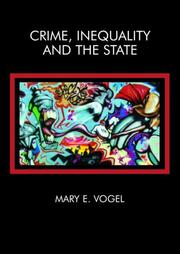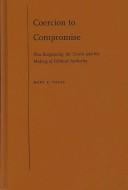| Listing 1 - 4 of 4 |
Sort by
|

ISBN: 0415382688 9780415382687 0415382696 9780415382694 9781000155358 1000155358 1003060587 9781003060581 9781000134032 1000134032 9781000116083 1000116085 Year: 2007 Publisher: London Routledge
Abstract | Keywords | Export | Availability | Bookmark
 Loading...
Loading...Choose an application
- Reference Manager
- EndNote
- RefWorks (Direct export to RefWorks)
This volume examines the role of poverty and inequality among the social dynamics that are shaping changing patterns of crime. It presents an integrated perspective on crime and state response in light of developments such as the hardening of poverty in American cities and the country's changing economic structure in a globalizing world. The volume includes works of Robert Sampson, William Julius Wilson, Michael Tonry, Jonathan Simon, Malcolm Feeley, Lorraine Gelsthorpe, Anthony Bottoms, John Hagedorn, Elijhah Anderson, Rosemary Gartner, Lawrence Friedman, Jurgen Habermas, Robert Putnam, Robin Kelley, Tom Tyler, Paul Wiles, Frank Zimring and Elliott Currie. This book has big US potential with a probable 75% of sales to US. Why has crime been dropping but imprisonment continuing to grow? This thoughtful and well-edited collection of readings focuses on explaining changing patterns of crime and criminal careers as well as state response through criminal justice policy. Countering the neo-conservative argument that crime is committed in a quest for thrills or because it pays, this volume builds on studies by Sampson and Wilson, Elijah Anderson and others, to continue the work of "bringing inequality and poverty back in" to policy debates about the causes of crime and what form state response should take. Examining changing patterns of crime and gang activity against a backdrop of deindustrialization and the hardening of urban poverty during the 1980s and then the economic upturn of more recent years, this volume probes changing patterns of violence -- especially among juveniles -- in center cities, gang activity and hate crimes during the late 1980s and 1990s. Vivid enthnography, biography, a play and musical lyrics are used along with qualitative and quantitative empirical studies to illustrate key points. Hard numbers are accompanied by the faces and voices of the individuals and families whose lives hang in the balance. Violent crime has now been dropping in most
Discrimination in criminal justice administration --- Crime --- Imprisonment --- Marginality, Social --- Sociological aspects --- Sociological aspects. --- #SBIB:343.9H0 --- Criminologie --- Exclusion, Social --- Marginal peoples --- Social exclusion --- Social marginality --- Assimilation (Sociology) --- Culture conflict --- Social isolation --- Sociology --- People with social disabilities --- Confinement --- Incarceration --- Corrections --- Detention of persons --- Punishment --- Prison-industrial complex --- Prisons --- Race discrimination in criminal justice administration --- Criminal justice, Administration of --- City crime --- Crime and criminals --- Crimes --- Delinquency --- Felonies --- Misdemeanors --- Urban crime --- Social problems --- Criminal law --- Criminals --- Criminology --- Transgression (Ethics) --- Social aspects --- School-to-prison pipeline --- Discrimination in criminal justice administration - United States --- Crime - United States - Sociological aspects --- Imprisonment - United States --- Marginality, Social - United States --- Discrimination in criminal justice administration - Great Britain --- Crime - Great Britain - Sociological aspects --- Imprisonment - Great Britain --- Marginality, Social - Great Britain
Book
ISBN: 0199851468 9780199851461 Year: 2007 Publisher: Oxford : Oxford University Press,
Abstract | Keywords | Export | Availability | Bookmark
 Loading...
Loading...Choose an application
- Reference Manager
- EndNote
- RefWorks (Direct export to RefWorks)
Examining the origins of the controversial practice of plea bargaining, this study shows the procedure to have emerged early in the American Republic. Vogel argues that it arose in the 1830s as part of a process of political stabilisation.
Plea bargaining --- Social classes --- Social aspects --- History --- Class distinction --- Classes, Social --- Rank --- Caste --- Estates (Social orders) --- Social status --- Class consciousness --- Classism --- Social stratification --- Bargaining, Plea --- Pleas of guilty

ISBN: 9780195101744 Year: 2007 Publisher: Oxford Oxford University Press
Abstract | Keywords | Export | Availability | Bookmark
 Loading...
Loading...Choose an application
- Reference Manager
- EndNote
- RefWorks (Direct export to RefWorks)
Book
ISBN: 0669013609 Year: 1977 Publisher: Lexington Heath
Abstract | Keywords | Export | Availability | Bookmark
 Loading...
Loading...Choose an application
- Reference Manager
- EndNote
- RefWorks (Direct export to RefWorks)
Local government --- State governments --- Technological innovations --- Case studies
| Listing 1 - 4 of 4 |
Sort by
|

 Search
Search Feedback
Feedback About UniCat
About UniCat  Help
Help News
News